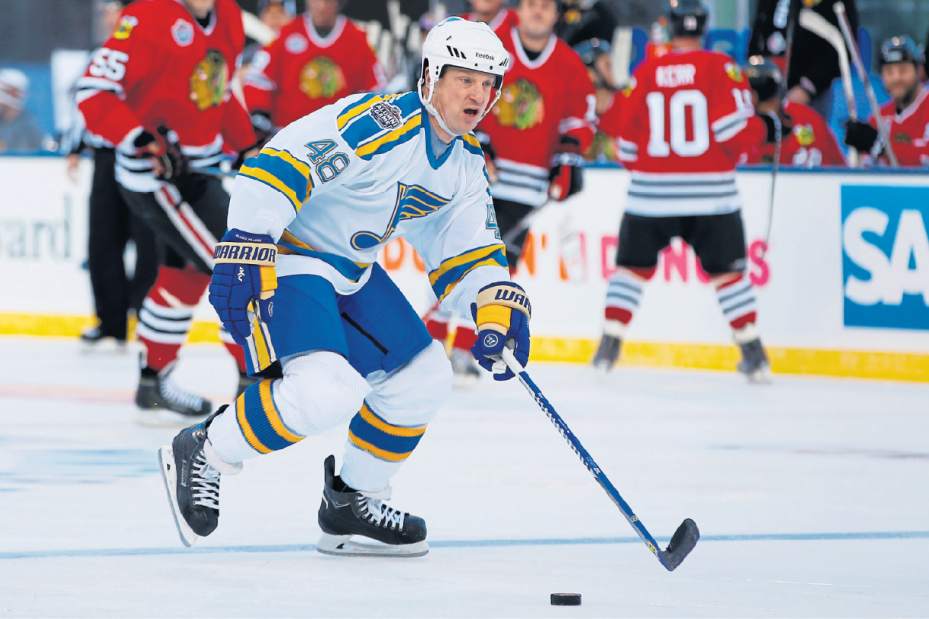https://archive.triblive.com/sports/penguins/penguins-scott-young-ready-to-lend-ear-to-prospects/
Penguins' Scott Young ready to lend ear to prospects

Former St. Louis Blues player Scott Young skates with the puck during the winter classic alumni outdoor hockey game against the Chicago Blackhawks at Busch Stadium, Saturday, Dec. 31, 2016, in St. Louis.
As the organization's new director of player development, Scott Young has begun the process of introducing himself to dozens of Penguins prospects.
It being 2017, he knows the first thing those young players will do after their initial meeting with him.
They'll Google him or look him up on YouTube.
Most of the organization's prospects were in grade school when Young retired from the NHL in 2006. Their memories of him as a player are hazy at best.
“They want to see if you scored goals and got in any fights,” Young said with a laugh.
Young scored goals all right — 342 of them in a 17-year career that included a brief stay on the Penguins' Stanley Cup championship team in 1991.
As for the fights? Five. And at least one, when he was a second-year pro with the Hartford Whalers in 1990, that he'd just as soon forget.
“Most people look up one with Mike Foligno,” Young said. “He catches me with one, and there's blood all over the place. I knew then and there that I had to score goals. I did not want to be a fighter.”
As director of player development, Young won't be asked to give fighting tips to Penguins prospects. He'll be charged with developing relationships with draft picks still with their junior, college or European teams as well as players under contract with Wilkes-Barre/Scranton of the AHL and Wheeling of the ECHL to make sure they are on the right path.
Young said his No. 1 objective isn't to correct any particular aspect of a prospect's game on the ice. It's to help him acquire the requisite maturity to play in the NHL.
That's a lesson Young learned as a 22-year-old on the 1991 championship team.
“I watched guys like Paul Coffey and how they worked out, why they were successful,” Young said. “He worked out after playing 30 minutes in a playoff game. He was in the gym, doing push-ups and sit-ups and on the bike. I realized at that point, for me to be in the league for a long time, I had to change some of my habits. It really had a big effect on me.”
What Young won't be is a whip-cracker, which is perfectly fine with his bosses. The Penguins believe it's the job of a prospect's coach to instill discipline. In player development, it's more about being a sounding board.
In fact, there are two things that Young and the two people who most recently preceded him in his current post, Mark Recchi and Bill Guerin, have in common.
First, they're accomplished NHL scorers, though general manager Jim Rutherford joked he didn't have a minimum goals requirement in mind when he filled the position.
Second, and more importantly, they're outgoing and personable, more from the Dan Bylsma side of the discipline ledger than the Michel Therrien school.
“With our organization, that's very clear. The lines are clear. A person in player development in our organization is not a coach,” said Guerin, who has since been promoted to assistant general manager. “He's a person to help players navigate their young careers.”
Hiring player development staffers with charisma is a low-key strength the Penguins have parlayed into success on NHL ice in recent years.
For one thing, it helps in the competitive college free agent recruiting process, which has secured the services of players such as Conor Sheary and Zach Aston-Reese for the Penguins. For another, it can help keep prospects from growing disgruntled while they're stationed in Wilkes-Barre.
Young is tasked with continuing that tradition.
“Scott's always been a good hockey guy. We had a lot of fun together,” said Guerin, who played with Young on the Dallas Stars from 2002-04. “Those are some of the attributes that players want. They want a guy who can carry a conversation.”
If the conversation turns to what he did on his summer vacation, Young will have plenty to talk about.
In June, he was selected for induction into the U.S. Hockey Hall of Fame. In August, he was named to Tony Granato's staff for the 2018 Olympics in South Korea.
“It's been a wild last couple of months,” Young said.
It's also been an unexpectedly quick rise up the ranks for someone who came into the coaching profession almost accidentally.
When he retired in 2006, Young took a few years off to coach his sons. In 2011, he got into coaching formally when the prep school he attended, St. Mark's in Massachusetts, had an opening. From there, he moved to another alma mater, BU, in 2014, first as director of hockey operations and then as an assistant coach.
“I never really had a plan of, ‘OK, I'm going to get into this. I'm going to climb the ladder. I'm going to try to get to this level,' ” Young said. “The plan was always to do what you love, and opportunities will come up. That's kind of what happened. I didn't plan on leaving St. Mark's. I didn't plan on leaving BU. But this was a great opportunity, and I'm excited about it.”
Jonathan Bombulie is a Tribune-Review staff writer. Reach him at jbombulie@tribweb.com or via Twitter at @BombulieTrib.
Copyright ©2025— Trib Total Media, LLC (TribLIVE.com)
